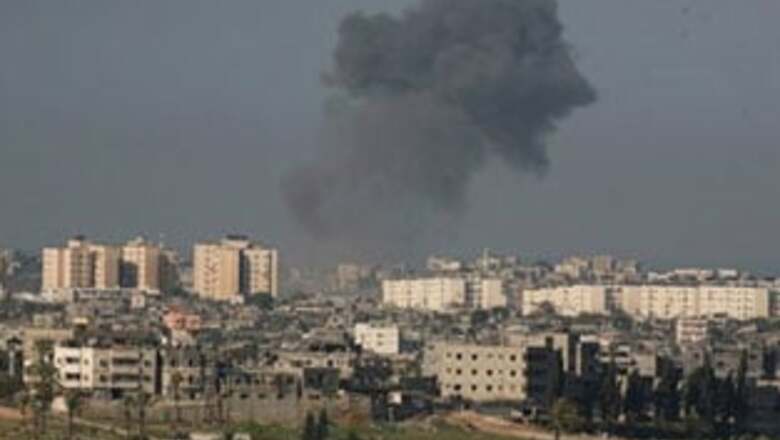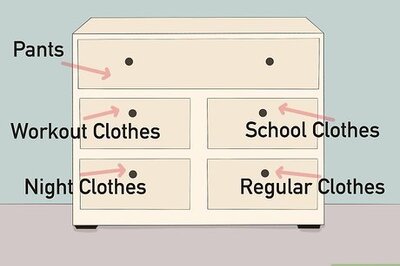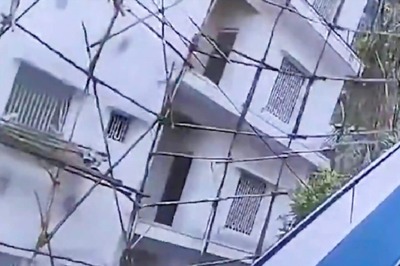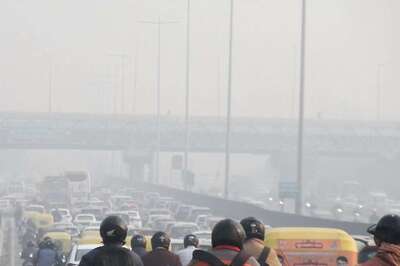
views
Gaza City, Gaza Strip: Israeli ground troops and tanks cut swaths through the Gaza Strip on early Sunday, cutting the coastal territory into two and surrounding its biggest city as the new phase of a devastating offensive against Hamas militants gained momentum.
The Israeli military used overwhelming firepower from tanks, artillery and aircraft to protect the advancing soldiers, and Gaza officials said at least 31 civilians were killed in the onslaught.
The military said troops killed several dozen militants, but Gaza officials could confirm only four dead - in part because rescue teams could not reach the battle zones. One Israeli soldier was killed.
The ground invasion and live images of the fighting in Gaza drew international condemnations and dominated news coverage on Arab satellite TV stations, many of which aired footage of wounded Palestinians at hospitals. Hamas threatened to turn Gaza into an Israeli "graveyard."
Thousands of soldiers in three brigade-size formations pushed into Gaza after nightfall Saturday, beginning a long-awaited ground offensive against the area's Hamas rulers after a week of intense aerial bombardment.
Black smoke billowed over Gaza City at first light as bursts of machine gun fire rang out.
The ground operation is the second phase in an offensive that began as a weeklong aerial onslaught aimed at halting Hamas rocket fire that has reached deeper and deeper into Israel, threatening major cities and one-eighth of Israel's population.
The new deaths brought the death toll in the Gaza Strip to more than 500 since December 27.
Palestinian and UN officials say at least 100 civilians are among the dead.
TV footage showed Israeli troops with night-vision goggles and camouflage face paint marching in single file.
Artillery barrages preceded their advance, and they moved through fields and orchards following bomb-sniffing dogs to guard against booby-traps.
Gaza City's civilians cowered inside as battles raged, while terrified residents in other areas fled in fear.
In the southern town of Rafah, one man loaded a donkey cart with mattresses and blankets preparing to flee.
Lubna Karam, 28, said she and the other nine members of her family spent the night huddled in the hallway of their Gaza City home.
The windows of the house were blown out days earlier in an Israeli airstrike, and the family has been without electricity for a week, surviving without heat and eating cold food.
She said no one slept overnight.
"We keep hearing the sounds of airplanes and we don't know if we'll live until tomorrow or not," she said.
Gaza health officials said the dead included a 12-year-old girl, five members of a single family, eight civilians killed by a tank shell in the northern Gaza town of Beit Lahiya, and an ambulance driver.
In his first public comments on the operation, Israeli Prime Minister Ehud Olmert told his Cabinet on Sunday that Israel could not allow its civilians to continue to be targeted by rockets from Gaza.
"This morning I can look every one you in the eyes and say the government did everything before deciding to go ahead with the operation. This operation was unavoidable," he said.
The military reported one soldier killed by mortar fire in northern Gaza — the first fatality of the offensive — and more than 30 others wounded, three seriously.
The offensive enjoyed widespread public support during its first week, but heavy Israeli casualties could quickly turn public opinion.
The Israeli chief of staff, Lt Gen Gabi Ashkenazi, told a meeting of Cabinet ministers that most of the fighting was at close range, with Hamas preferring to fight in built-up areas rather than on open ground. Ashkenazi said the operation aimed to take over areas militants use to launch rockets.
Military intelligence chief Maj Gen Amos Yadlin told the Cabinet that Hamas was using mosques, public institutions and private houses as ammunition stores.
Yuval Diskin, the head of Israel's Shin Bet security service, told the ministers there was a "weakening" in Hamas' desire to keep fighting.
Still, he said, while the Hamas political leadership has been hit hard, its military organization has "yet to be dealt the harsh blow Israel expects it to be dealt." The security officials' comments were relayed to the press by the Cabinet secretary, Oved Yehezkel.
A senior military officer said Hamas was well-prepared for the Israeli incursion into Gaza, a densely populated territory of 1.4 million where militants operate and easily hide in the crowded urban landscape. He said the operation was "not a rapid one that would end in hours or a few days."
Still, he said, Israel would not remain in Gaza "for the long term." He spoke on condition of anonymity in accordance with army regulations.
"You entered like rats," Hamas spokesman Ismail Radwan told Israeli soldiers in a statement on Hamas' Al Aqsa TV. "Gaza will be a graveyard for you, God willing," he said.
The Hamas Interior Ministry said it was still in control of Gaza and had captured residents collaborating with Israel, as well as traders exploiting the situation to inflate their prices.
Rocket fire into Israel has persisted, and more than 30 rockets and mortar shells fell in Israel on Sunday morning, sending Israelis scrambling for bomb shelters. Two Israelis were lightly wounded. In much of southern Israel, school has been canceled and life has been largely paralysed.
While the air offensive presented little risk for Israel's army, sending in ground troops is a much more dangerous proposition. Hamas is believed to have some 20,000 gunmen and has had time to prepare. Israeli leaders had resisted a ground invasion for months, fearing heavy casualties.
Israel has called up tens of thousands of reserve soldiers, which defense officials said could enable a far broader ground offensive. The troops could also be used in the event Palestinian militants in the West Bank or Hezbollah guerrillas in Lebanon decide to launch attacks, as Hezbollah did in 2006 when Israel was in the midst of a large operation in Gaza.
An armored force south of Gaza City penetrated as deep as the abandoned settlement of Netzarim, which Israel left along with other Israeli communities when it pulled out of Gaza in 2005.
That move effectively cut off Gaza City, the territory's largest population center with some 400,000 residents, from the rest of Gaza to the south.
The offensive focused on northern Gaza, where most of the rockets are fired into Israel, but at least one incursion was reported in the southern part of the strip. Hamas uses smuggling tunnels along the southern border with Egypt to bring in weapons.
Ground forces did not enter major Gaza towns and cities, instead fighting in rural communities and open areas militants often use to launch rockets and mortar rounds.
Israel launched the air campaign against Gaza on December 27 with the aim of halting incessant rocket fire on its south. The operation appears to have slowed but not halted the rocket fire.
Hundreds of rockets have hit Israel since the offensive began, and four Israelis have been killed. The relatively low number of Israeli casualties is largely due to warning sirens that give residents notice of incoming missiles and allow them to take cover.
The death toll in Gaza has outraged many. UN Secretary General Ban Ki-moon conveyed his "extreme concern and disappointment" to Olmert and called for an "immediate end" to the operation.
Denunciations also came from the French government, which unsuccessfully proposed a two-day truce earlier this week, and from Egypt, Turkey and Jordan, Muslim nations with ties to Israel.
Palestinian President Mahmoud Abbas, a rival of Hamas who governs from the West Bank, condemned the Israeli invasion as "brutal aggression."
An Israeli government statement said Israeli leaders have been in contact with their counterparts abroad and encountered "much understanding" of the country's actions.
The US has put the blame squarely on Hamas. At an emergency consultation of the UN Security Council on Saturday night, the US blocked approval of a statement demanded by Arab countries calling for an immediate cease-fire and expressing serious concern at the escalation of violence.
Hamas emerged as Gaza's main power broker when it won Palestinian parliamentary elections three years ago. It has ruled the impoverished territory since seizing control from forces loyal to Abbas in June 2007.
In the West Bank, Israeli troops shot and killed a 20-year-old Palestinian who was demonstrating against the Gaza offensive.
The army said troops were quelling a violent demonstration and shot at the man when he tried to climb over Israel's West Bank separation barrier and ignored orders to stop.

















Comments
0 comment